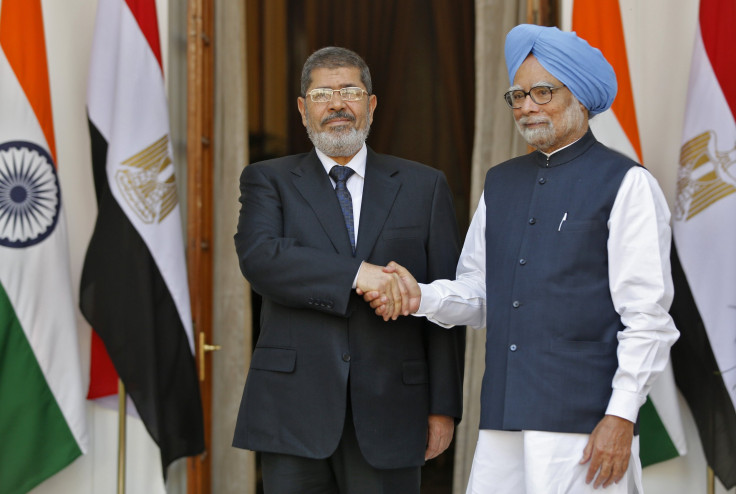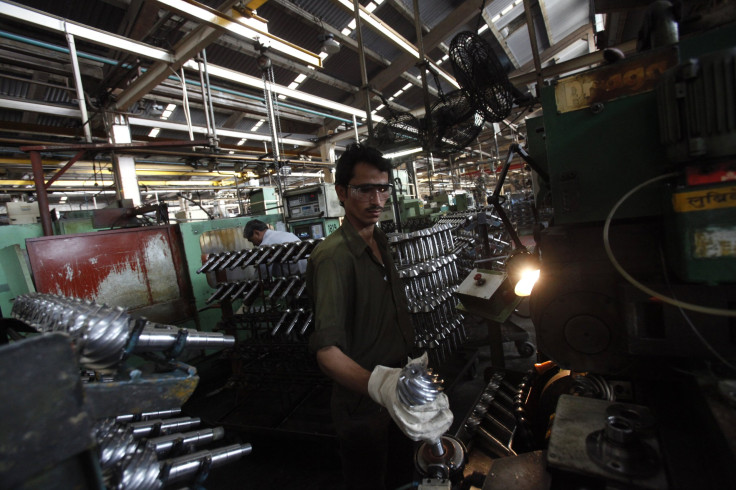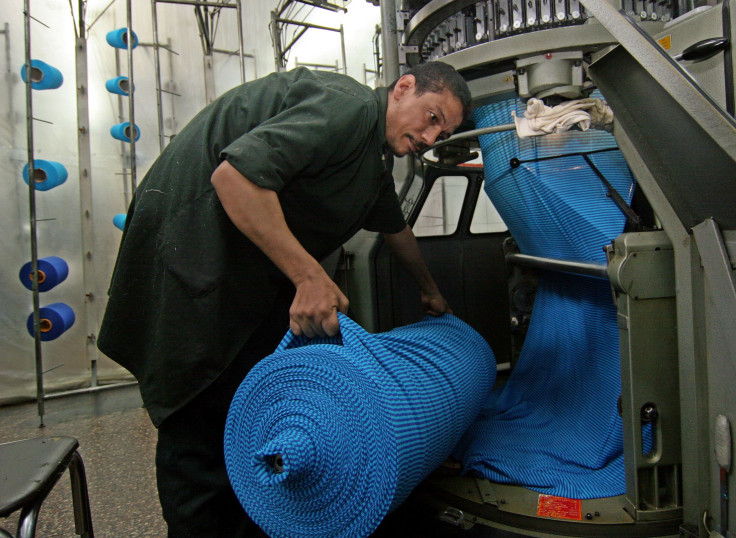Egypt And India Bring Two Opposite Economies Together: Great Trade For An Odd Couple

A pivotal link between Asia and Africa was cemented this week when Egyptian President Mohamed Morsi traveled to meet Indian Prime Minister Manmohan Singh.
Though the two economies have little in common, Egypt and India stand to benefit greatly. The partnership will do more than link up two of the world’s most important economic systems -- it will also help Egypt to maintain its diplomatic independence by lessening its reliance on Western powers.
Typically, that’s China’s game; the world’s second-largest economy is putting down roots all across Africa. China’s annual bilateral trade with Egypt is around $9 billion, making it Egypt’s third-largest trading partner after the United States and the European Union. India comes in seventh -- but it’s now looking to move up in the ranks.
Morsi said he wants to double bilateral trade with India, which is currently estimated at $5 billion annually, over the next few years. He also revealed an ambition to become one of the world’s fastest-growing economies, a club to which Brazil, Russia, India, China and South Africa, the so-called BRICS, now belong.
"I am hoping Brics would one day become E-brics, where E stands for Egypt," Morsi said to The Hindu on Monday. "I hope E-Brics would emerge when we start moving the economy."
Unwieldiness aside, the acronym must have sounded good to Indian investors. This week, several Indian companies representing various industries agreed to spend up to $400 million on projects in Egypt, according to the Egyptian newspaper Ahram.
Up to $300 million of that would come from the Sanmar Group, a chemicals conglomerate, and another $100 billion is expected from the Egyptian-Indian Polyester Company. Sanmar already has a plastics operation in Port Said, and Egyptian-Indian Polyester has a plant in Ain Sokhna, on the Gulf of Suez.

At first glance, it looks odd that Asia’s powerhouses would vie for influence in an economy as small as Egypt’s. Both China’s and India’s annual GDPs are measured in the trillions, and they grew by 7.8 percent and 5.4 percent, respectively, in 2012. Egypt, on the other hand, had a GDP of $255 billion last year and growth of only 2 percent, according to the U.S. Central Intelligence Agency.
The country is struggling politically, having elected a president who is unpopular among the many secular urban youths who first banded together in 2011 to oust former autocrat Hosni Mubarak. Opposition leaders and activists argue that the Islamist administration does not respect minority rights, and their concerns are not assuaged by the overzealousness of police and security officials, apparently unreformed since the Mubarak era.
And then there are money troubles. Unemployment is at 13 percent, according to government data, and about one in four people live in poverty. The value of the Egyptian pound has fallen steadily against the U.S. dollar. Foreign currency reserves dipped below a 15-year low in January of this year, and went on to hit $13.5 billion at the end of February. The funds are not expected to last three months.
Two more signs of trouble came on Thursday. First, Moody’s Investors Service downgraded Egypt’s credit rating by a notch, to Caa1. Then the central bank made a tough decision to raise interest rates in order to beat back inflation, at the risk of saddling growth.
Egypt is in negotiations with the Internal Monetary Fund to secure a $4.8 billion loan, but the move has been delayed over concerns about Egypt’s policies. The IMF wants the government to enforce austerity measures, which might mean collecting more taxes or slashing the country’s cumbersome fuel and energy subsidies, which drain more than 10 percent of GDP annually.
Cairo is keen to secure that loan, but the pro-austerity conditions attached to it are an impossible sell at this point. There is no way Morsi will risk incurring more public animosity -- he’s got plenty already -- before parliamentary elections are held, which were going to take place in April but have since been postponed.
Economic morass notwithstanding, Egypt does have some leverage: No one wants the fledgling democracy to collapse, because its stability is integral to security and trade in the Middle East.
Egypt is the region’s most populous country; it also sits at the nexus of Asia and Africa. An economic default there would send shock waves around the world, especially since Western powers like the United States have great interest in maintaining Egypt as a diplomatic ally and security partner. Morsi is in dire straits politically and economically, but odds are he can count on global powers to bail him out if necessary.

Those basic strengths are attractive to India -- enough to make Egypt a suitable long-term investment. In terms of trade, the countries could mesh nicely; Egyptian exports consist mainly of crude oil, produce and cotton. And with its fast-expanding population, it can offer an expanding consumer market and human capital in the form of labor. India has come to specialize in engineering goods, chemicals, and refined petroleum -- capital intensive products that Egypt has little capacity to produce itself.
Then there are historical connections. India’s first Prime Minister Jawaharlal Nehru and Egypt’s iconic second President Gamal Abdel Nasser were among the five original founders of the Non-Aligned Movement, or NAM -- they were also friends. The organization, which sought to represent countries that did not take sides the Cold War, still stands for solidarity and strength in the face of major world powers.
Today, the two biggest world powers are not the West and the Soviet Union, but the United States and China. The two nations currently dominate Egyptian trade, along with the EU.
India at least has a leg up in terms of shared history, and this week’s meeting between leaders seems to herald the strengthening of an old partnership. Egypt is, after all, desperate for new investments as its political problems increasingly deter foreign powers and the IMF.
“The levels of foreign direct investment in Egypt has dropped from 25 percent to 9 percent, especially in this period when the country is going through a political transition,” said Egyptian Minister of Investment Osama Saleh on Thursday, according to the Indo-Asian News Service. “Our aim is for FDI to pick up to levels of around 20 percent.”
India will be key to achieving that goal, and Singh noted on Wednesday that the benefits would extend to his country as well.
“[Egypt] is a bridge between Asia and Africa, astride a major global trade route, together with its skilled human resources, makes it an attractive business destination for India,” he said, according to Egypt’s Daily News.
“Morsi and I agreed that this provides a solid bedrock on which to build a strong and durable bilateral relationship and international partnership between our two countries.”
© Copyright IBTimes 2024. All rights reserved.






















